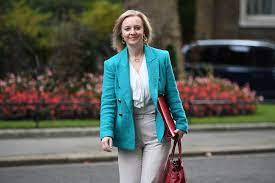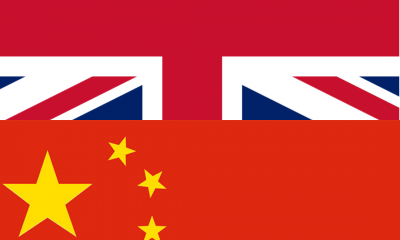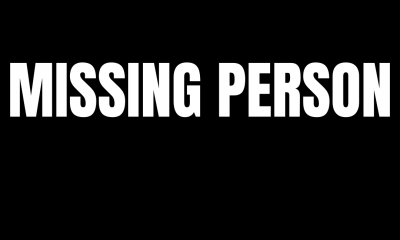Foreign News
Britain’s Foreign Secretary Truss Confirms Bid to Replace PM Johnson

Britain’s Foreign Secretary Liz Truss announced her bid to become the Conservative party’s new leader on Sunday, making her the tenth contender in the race.
The new Tory leader will replace Prime Minister Boris Johnson, who was forced to step down after dozens of members of government resigned in protest after a series of scandals.
Truss, a senior Cabinet minister widely expected to be a front-runner in the already crowded race, promised to “start cutting taxes from day one” to help with the cost of living.
She joins contenders including trade minister Penny Mordaunt, former health secretaries Sajid Javid and Jeremy Hunt, ex-chancellor Rishi Sunak, his successor Nadhim Zahawi, and Transport Secretary Grant Shapps.
Former minister Kemi Badenoch and senior backbencher Tom Tugendhat have also thrown their hats into the ring.
Truss’s pledge to scrap a controversial national insurance rise which came into effect in April, mirrors that of rival Javid.
It marks a departure from her defence of the policy as a minister in Johnson’s Cabinet, prior to his resignation, when she was bound by collective responsibility to support the move publicly.
The levy was introduced to raise funds for the NHS and social care, but has proved controversial at a time when households are feeling the squeeze from soaring food and energy bills.
Truss argued “it isn’t right to be putting up taxes now”, and as leader she would take “immediate action” to assist with living costs.
She said she would “keep corporation tax competitive” – hinting that she wants to look again at Sunak’s plans to hike the rate in April 2023, but did not go so far as to match some of her fellow contenders’ pledges to scrap the rise entirely.
Truss said she would “get the private sector growing faster than the public sector, with a long-term plan to bring down the size of the state and the tax burden”.
Writing in The Telegraph, she said: “Under my leadership, I would start cutting taxes from day one to take immediate action to help people deal with the cost of living.
“I would reverse the national insurance increase that came in during April, make sure we keep corporation tax competitive so we can attract business and investment into Britain, and put the Covid debt on a longer-term footing.”
Truss said her plan would get the country back on track towards becoming a “high-growth and high-productivity powerhouse”.
“It is built on a clear and longstanding Conservative philosophy, including bold supply-side reform,” she added.
She said she had “led the way” in making the most of Britain’s “new-found freedoms” outside the EU, but insisted “we can go further, whether it is doing more to champion innovation or charting our own course on regulation”.
She said she would bring “clear and decisive leadership” to Downing Street, adding: “Colleagues know I mean what I say and only make promises I can keep. I can be trusted to deliver.”
Truss said the Tories can win the next election, but acknowledged it will be “an uphill battle”.
Earlier, announcing her bid for the top job, Mordaunt said the UK’s leadership “needs to become a little less about the leader and a lot more about the ship”.
Candidates populated the Sunday morning broadcast round, with Hunt, Javid, Shapps and Tugendhat all making appearances to promote their campaigns.
Foreign News
President Yoon Banned from Leaving South Korea

The South Korean Government ordered an overseas travel ban on President Yoon Suk Yeol.The South Korean news agency Yonhap reported on Monday that the travel ban is due to the ongoing investigation into Yoon, which involves suspicion of high treason.Yoon unexpectedly imposed martial law on his country last Tuesday night, but hours later, after massive political resistance, he repealed the order.
On Saturday evening, a motion by the opposition to impeach the president in parliament failed. However, public pressure against the 63-year-old continues. (dpa/NAN)Foreign News
Israel Threatens to Expand War if Hezbollah Truce Collapses

Israel threatened on Tuesday to return to war in Lebanon if its truce with Hezbollah collapses and said this time its attacks would go deeper and target the Lebanese state itself, after the deadliest day since the ceasefire was agreed last week.
In its strongest threat since the truce was agreed to end 14 months of war with Hezbollah, Israel said it would hold Lebanon responsible for failing to disarm militants who violated the truce.
“If we return to war we will act strongly, we will go deeper, and the most important thing they need to know: that there will be no longer be an exemption for the state of Lebanon,” Defence Minister Israel Katz said.
“If until now we separated the state of Lebanon from Hezbollah… it will no longer be (like this),” he said during a visit to the northern border area.
Despite last week’s truce, Israeli forces have continued strikes in southern Lebanon against what they say are Hezbollah fighters ignoring the agreement to halt attacks and withdraw beyond the Litani River, about 30 km (18 miles) from the frontier.
On Monday, Hezbollah shelled an Israeli military post, while Lebanese authorities said at least 12 people were killed in Israeli airstrikes on Lebanon.
Katz called the Hezbollah attack “the first test” and described Israel’s strikes as a strong response.
The Beirut government must “authorise the Lebanese army to enforce their part, to keep Hezbollah away beyond the Litani, and to dismantle all the infrastructure,” Katz said.
“If they don’t do it and this whole agreement collapses then the reality will be very clear.”
Top Lebanese officials urged Washington and Paris to press Israel to uphold the ceasefire, after dozens of military operations on Lebanese soil that Beirut has deemed violations, two senior Lebanese political sources told Reuters on Tuesday.
The sources said caretaker Prime Minister Najib Mikati and Speaker of Parliament Nabih Berri, a close Hezbollah ally who negotiated the deal on behalf of Lebanon, spoke to officials at the White House and French presidency late on Monday.
Mikati, quoted by the Lebanese news agency, said that diplomatic communications had intensified since Monday to stop Israeli violations of the ceasefire.
He also said a recruitment drive was under way by the Lebanese army to strengthen its presence in the south.
U.S. State Department spokesperson Matt Miller told reporters on Monday that the ceasefire “is holding” and that the U.S. had “anticipated that there might be violations”.
Neither the French presidency nor the foreign ministry were immediately available to comment.
French Foreign Minister Jean-Noel Barrot spoke to his Israeli counterpart Gideon Saar on Monday, saying both sides should adhere to the ceasefire.
The truce came into effect on Nov. 27 and prohibits Israel from conducting offensive military operations in Lebanon, while requiring Lebanon to prevent armed groups including Hezbollah from launching attacks on Israel.
It gives Israeli troops 60 days to withdraw from south Lebanon.
A mission chaired by the United States is tasked with monitoring, verifying, and helping enforce the truce, but it has yet to begin work.
Berri on Monday called on the mission to “urgently” ensure Israel halts its breaches, saying Beirut had logged at least 54 Israeli violations of the ceasefire so far.
Israel has said its continued activity in Lebanon is aimed at enforcing the ceasefire.
Lebanon’s Mikati met in Beirut on Monday with U.S. General Jasper Jeffers, who will chair the monitoring committee.
Two sources familiar with the matter told Reuters that France’s representative to the committee, General Guillaume Ponchin, would arrive in Beirut on Wednesday and that the committee would hold its first meeting on Thursday.
“There is an urgency to finalise the mechanism, otherwise it will be too late,” the source said, referring to Israel’s gradual intensification of strikes even with the truce in place. (Reuters/NAN)
Foreign News
Starmer Rules out Re-running UK Election as Petition Gets Signatures

British Prime Minister Keir Starmer has ruled out calling another general election, but said he is “not surprised” some people who did not support his party, Labour, might want a second poll.
A petition on Parliament’s website calling for another election has now been signed by more than two million people.
“I would like there to be another general election,” it reads.
“I believe the current Labour Government have gone back on the promises they laid out in the lead-up to the last election.
”Asked about the petition on ITV’s “This Morning” programme on Monday, Starmer said: “Look, I remind myself that very many people didn’t vote Labour at the last election.
“I’m not surprised that many of them want a re-run. That isn’t how our system works.
“There will be plenty of people who didn’t want us in the first place.
“So, what my focus is on is the decisions that I have to make every day.”
He characterized decisions taken so far by his government as “tough but fair.”
Starmer and his ministers have faced a particularly strong backlash for limiting winter fuel payments to only the poorest pensioners.
Farmers have also protested over changes to inheritance tax which they claim could affect the future of their businesses.
As he marks five months as prime minister, Starmer acknowledged the job has been difficult, but added: “I wouldn’t swap a single day in opposition for a day in power.
“It’s much better to be in power to do things, rather than the frustration, as I found it, in opposition for all of those long years where we were just able to say what we would do.”
The petition calling for another general election is open for signatures until May 2025.
While the vast majority of those signing it are from the UK, it has also gained support from other countries.
More than 1,200 people from the U.S. have added their names to it, with similar a number from France doing the same.
American signatories may have been made aware of the petition by Elon Musk, the businessman and ally of President-elect Donald Trump.
He shared the petition on X, the social media site he owns formerly known as Twitter, claiming “the people of Britain have had enough of a tyrannical police state”.
Starmer’s office sought to avoid being drawn into a war of words with Mr Musk.
The prime minister’s official spokesman added Starmer was “focused on the issues that matter most to the British people.”
Although it has garnered media attention and millions of signatures, it is far from the largest petition received through the Parliament website, or the one which has seen the most rapid take-up.
In 2019, some 6.1 million people signed a petition calling for the revocation of Article 50 and for the United Kingdom to remain in the European Union, four million of whom did so in 48 hours.
The second most-signed petition gained 4.1 million signatures.
The 2016 petition called for a second referendum on the UK’s membership of the European Union following the Brexit vote.
Because the election petition has received 10,000 signatures, ministers will issue a response to it.
MPs may consider it further in a Westminster Hall debate because it has been signed by more than 100,000 people, although this is not guaranteed.
A petition which has successfully made it to debate is one calling for social media companies to ban under 16-year-olds from their platforms after it received more than 110,00 signatures.
Another calling for the law around school term-time holidays to be relaxed, which received 250,000 signatures, was due for debate on Monday afternoon.
Michael Westwood, the man who started the petition, has confirmed he voted Conservative at the summer election.
But he told Talk TV he did not know if this would be the case again, adding: “One thing’s for certain, I wouldn’t be voting Labour.”
Among those sharing the petition online was retired actor Sir Michael Caine, who has been critical of Labour governments in the past. (PA Media/dpa/NAN)
































